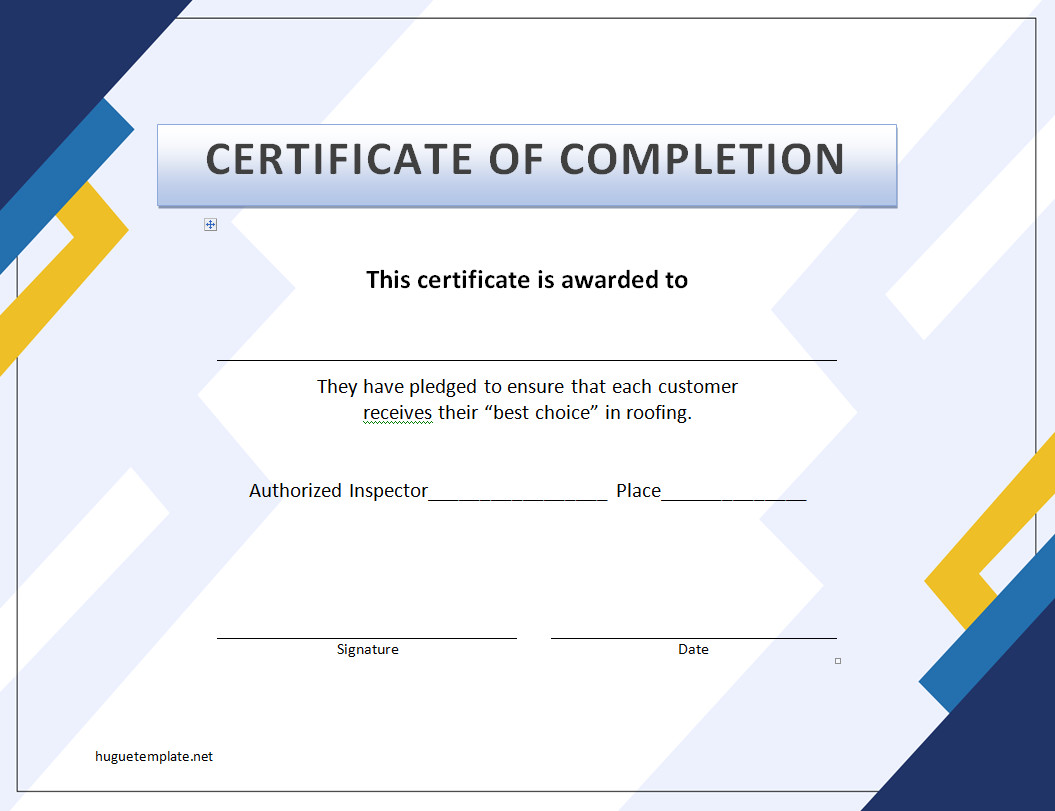When it comes to roof installations, ensuring that the job is completed successfully is of utmost importance. A roof completion certificate serves as an agreement between the contractor and the client, stating that the work has been finished to the client’s satisfaction. This certificate not only creates a record of the completion of the roofing work but also provides peace of mind to the client.
This article will explore what a roof completion certificate is, why it is necessary, the cost of obtaining one, the process involved in certification, what roof inspectors look for, and how often you should get your roof inspected.
What is a Roof Completion Certificate?
A roof completion certificate is a document that signifies the successful completion of a roofing project. It serves as an agreement between the contractor and the client, stating that the work has been finished to the satisfaction of the client. This certificate acts as proof that the roofing work has been completed according to the agreed-upon terms and conditions.
Typically, a roof completion certificate includes important details such as the name and contact information of the contractor and client, the address of the property where the roofing work was carried out, the date of completion, and any warranties or guarantees provided by the contractor.

Why is a Roof Completion Certificate Necessary?
A roof completion certificate is necessary for several reasons.
- It provides legal protection to both the contractor and the client. In case of any disputes or claims in the future, the certificate serves as evidence that the work was completed successfully and to the client’s satisfaction.
- This certificate creates a record of the roofing work done. This record can be useful for insurance purposes, property valuation, and potential future buyers or renters who may want to verify the quality and completion of the roof installation.
- This certificate ensures that the client is fully satisfied with the roofing work. It acts as a formal agreement between the contractor and the client, giving the client peace of mind that the work has been completed according to their expectations.
How Much Does a Roof Certification Cost?
The cost of obtaining a roof completion certificate can vary depending on various factors such as the size and complexity of the roof, the location of the property, and the specific requirements of the certification process. Generally, the cost can range from $100 to $500.
It’s important to note that the cost of the certificate should be considered as an investment in ensuring the quality and completion of the roofing work. It provides legal protection and peace of mind to both the contractor and the client.
What Happens During A Roof Certification?
The process of obtaining a roof completion certificate involves a thorough inspection of the roof by a qualified roof inspector. During the certification process, the inspector will assess various aspects of the roof to ensure its quality and compliance with building codes and regulations.
The inspector will examine the condition of the roof materials, such as shingles or tiles, to check for any signs of damage or deterioration. They will also inspect the flashing, gutters, vents, and other components of the roof to ensure they are properly installed and functioning correctly.
If any issues or deficiencies are identified during the inspection, the contractor will be notified and allowed to address and rectify them before the certification can be issued. Once the roof passes the inspection and meets all the necessary criteria, the roof completion certificate will be provided to the client.
What Do Roof Inspectors Look For?
Roof inspectors are trained professionals who have expertise in assessing the condition and quality of roofs. During a roof inspection for certification, they look for various factors to ensure that the roof is structurally sound and meets the required standards.
Some of the key aspects that roof inspectors look for include:
- Roofing Materials: Inspectors check the quality and condition of the roofing materials, such as shingles, tiles, or metal sheets. They look for any signs of damage, wear, or deterioration that may affect the performance and longevity of the roof.
- Flashing and Sealants: The flashing and sealants around chimneys, vents, skylights, and other roof penetrations are inspected to ensure they are properly installed and sealed. This helps prevent water leaks and potential damage to the roof and interior of the property.
- Gutters and Drainage: Inspectors check the gutters and downspouts to ensure they are clear of debris and properly functioning. Adequate drainage is essential to prevent water from pooling on the roof, which can lead to leaks and damage.
- Ventilation: Proper ventilation is crucial for maintaining a healthy roof. Inspectors assess the ventilation system to ensure that it allows for proper air circulation, preventing moisture buildup and potential issues such as mold or rot.
- Overall Roof Condition: The inspector will assess the overall condition of the roof, looking for any signs of sagging, structural damage, or other issues that may compromise its integrity. They will also check for any visible signs of leaks or water damage.
How Often Should You Get Your Roof Inspected?
Regular roof inspections are essential for the maintenance and longevity of your roof. While the frequency of inspections may vary depending on factors such as the age and condition of the roof, it is generally recommended to have a professional roof inspection at least once every two to three years.
In addition to regular inspections, it is also important to have your roof inspected after severe weather events such as storms or hurricanes, as these can cause damage that may not be immediately visible. Prompt inspections and repairs can help prevent further damage and ensure the continued performance of your roof.
Final Thoughts
A roof completion certificate is a crucial document that signifies the successful completion of a roofing project. It provides legal protection, creates a record of the roofing work, and ensures the satisfaction of the client.
By obtaining a roof completion certificate and regularly inspecting your roof, you can maintain the quality and longevity of your roof, protecting your investment in your property.
Roof Completion Certificate Template – Word

I am Huguette Prudence, the writer and curator of this website. With a profound passion for writing and reading, I strive to create insightful and engaging content. My background includes managing a small online shop and overseeing a business website, experiences that have honed my skills and broadened my understanding of effective online communication. Thank you for visiting Huguetemplate.net, where I aim to share knowledge and inspiration through carefully crafted content.